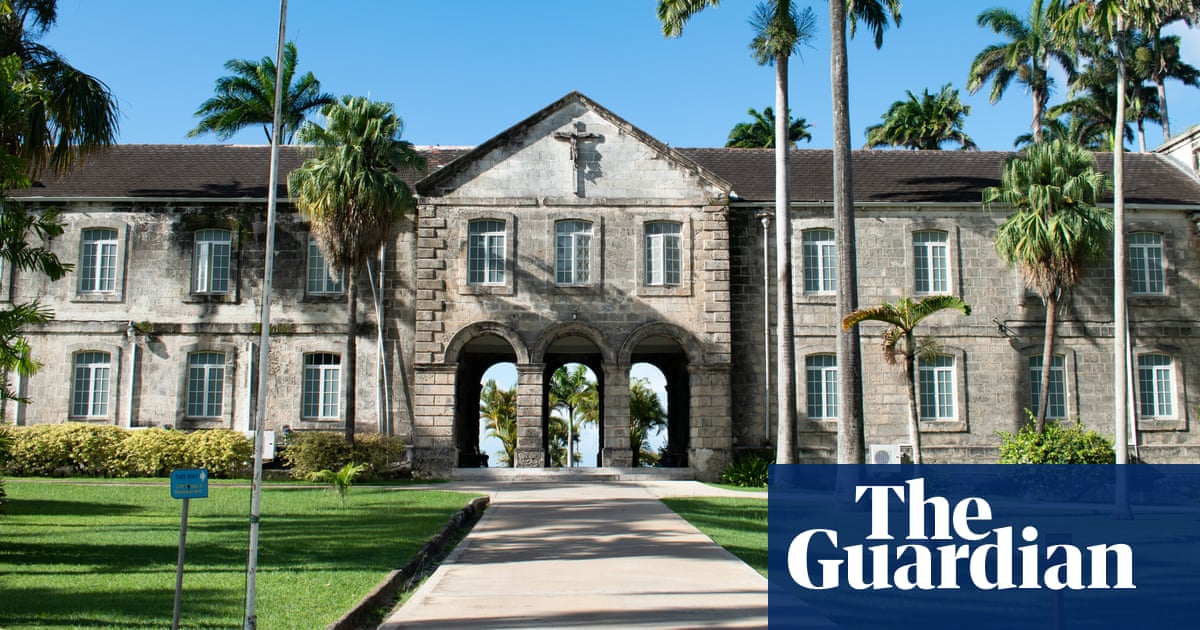An Anglican church group is to launch a £7m reconciliation project in Barbados to atone for the atrocities of transatlantic slavery and compensate descendants of enslaved people.
United Society Partners in the Gospel (USPG), a UK-based missionary organisation created in 1701 to convert people in the colonies to Christianity, will work with local and regional partners in the Caribbean to allocate money to education and entrepreneurial grants and historical research. It will also support land ownership among descendants of enslaved people.
The project, which launches on Saturday, will focus on communities living on the Codrington estate in eastern Barbados. Once the site of two thriving sugar plantations, generating an estimated income of £5m a year in today’s money, the estate was owned by the planter Christopher Codrington. He bequeathed it to the Society for the Propagation of the Gospel in Foreign Parts (SPG), which would later become USPG.
Codrington’s will stipulated he wanted 300 enslaved people to work on the plantation and the establishment of a theological college. Today, the college and the estate are managed by a government-established trust that is working with USPG on the project.
Dr Duncan Dormor, an Anglican priest and the general secretary of USPG, described the initiative as a critical step in addressing the injustices and crimes of the church during the transatlantic slave trade. He added that previous apologies from Anglican institutions needed to go further.
“Back in 2006, then archbishop of Canterbury, Rowan Williams, made a very public statement apologising on behalf of the Church of England for what went on at Codrington,” he said. “That apology included and covered USPG. However, I felt that we had not expressed our regret and remorse with enough seriousness and detail. Just to say, ‘we’re sorry’ – sorry for what, and what are we going to do about it?”
Dormor said he wanted the project to be guided by the perspectives of descendants of enslaved people. USPG and the Codrington Trust have appointed an 11-member steering committee, which includes local people and regional representatives such as the Caribbean historian Sir Hilary Beckles. Beckles is the chair of a Caribbean Community (Caricom) commission that seeks reparations from countries that facilitated and benefited from centuries of chattel slavery.
Dormor added that he hoped the USPG project would help raise awareness in the UK about the importance of supporting the 200-year-delayed justice and repair for enslaved people and their descendants.
David Comissiong, the Barbados ambassador to Caricom and the deputy chair of the Barbados National Task Force on Reparations, welcomed the USPG project.
He said: “While the task force considers the Codrington project to be a social justice project grounded in the principles of ecumenism rather than a ‘reparations’ or ‘reparatory justice’ project, we still feel obliged to put on record our admiration of the Christian spirit of justice that has been evinced by both the USPG and the Church Commissioners – the two entities of the Church of England that have thus far publicly acknowledged their implication in the crime of African enslavement and their determination to make some form of recompense.
“We believe that the words and actions of these two Anglican religious bodies have the potential to help generate significant breakthroughs in
Caricom’s reparations claims against both the Church of England and the national government of the UK and to help usher in a new era of reparatory justice, reconciliation and brotherhood, and we invite the USPG to augment the power of the initiative they have undertaken by committing to a ‘reparations conversation’ with our task force.”
after newsletter promotion
The USPG project launch coincides with the annual Africa Union-Caricom Day on 7 September, which was established at an inaugural joint summit in 2021.
The Codrington Trust executive secretary, Kevin Farmer, explained the significance of launching the project on Africa Union-Caricom Day: “The majority of the people in the Caribbean were trafficked from the [African] continent. Joining forces on this day is a signal that this is an attempt to repair a very traumatic past.”
Farmer added that the USPG project could become a model for slavery reconciliation and renewal.
“This hasn’t been done in the region as yet,” he said. “Here is a church that provided moral sanction to racialised slavery and enslavement and a church agent, USPG, coming 200 years later, recognising the wrong and their complicity and part in it and speaking with descendants of the enslaved about how to seek repair and reconciliation.”
